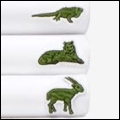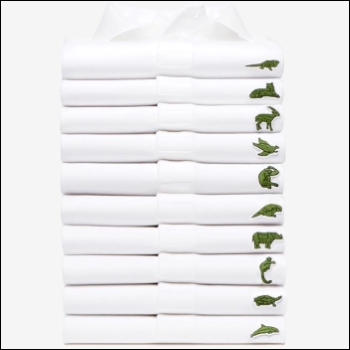Ten threatened species embroidered on Lacoste polo shirts made of recyclable cotton

Date : February 28th, 2018
Event : capsule collection of 1775 Lacoste polo shirts, embroidered with threatened species
On February 28th, Lacoste replaced its iconic crocodile with a threatened specie, to help raise awareness about IUCN’s Save Our Species programm. Polo shirts will be sold 150€ each, and a part will be donated to the UICN, in the frame of a three-year partnership.

The number of shirts produced for each species corresponded to the number of individuals known to remain in the wild(*) and the capsule collection of 1775 polos have been sold in less than 24 hours.
photo © Lacoste
Lacoste >>
Save Our Species >>
(*) The threatened species are:
30 Vaquitas, Gulf of California porpoise, critically endangered species due to shrimp gillnets in which it can get entangled.
40 Burmese Roofed Turtles, rampant egg collection for local and distant consumption, easily predictable nesting sites and reproduction periods make it an endangered species with man as its first predator.
50 Northern Sportive Lemurs of Northern Madagascar, threatened by intensive poaching and the destruction of its habitat for agriculture and deforestation.
67 Javan Rhinos, now only found in Indonesia, under the protection of the Rhino Protection Unit, both in plains and rainforest are endangered because of their low reproduction rate as well as intensive poaching for their horns.
150 Cao-vit Gibbons are found in a forest located at the border of China and Vietnam, where deforestation reduces its habitat.
157 Kakapos native to New-Zeland, endangered mostly because of its very low reproductive rate.
231 California Condors, threatened by lead poisoning and human-induced garbage that pollutes its natural habitat.
250 Saolas living in the forests and mountains of Vietnam and Laos, threatened due to intensive poaching in the area.
350 Sumatran Tigers genetically distinct from other territorial tigers and constituting a subspecies in itself, threatened by poaching and deforestation.
450 Anegada Ground Iguanas, native to the British Virgin Island of Anegada, cattle breeding and agriculture make their habitat shrink and feral cats and dogs find them quite tasty.
Wednesday 28 February 2018, 19:02










